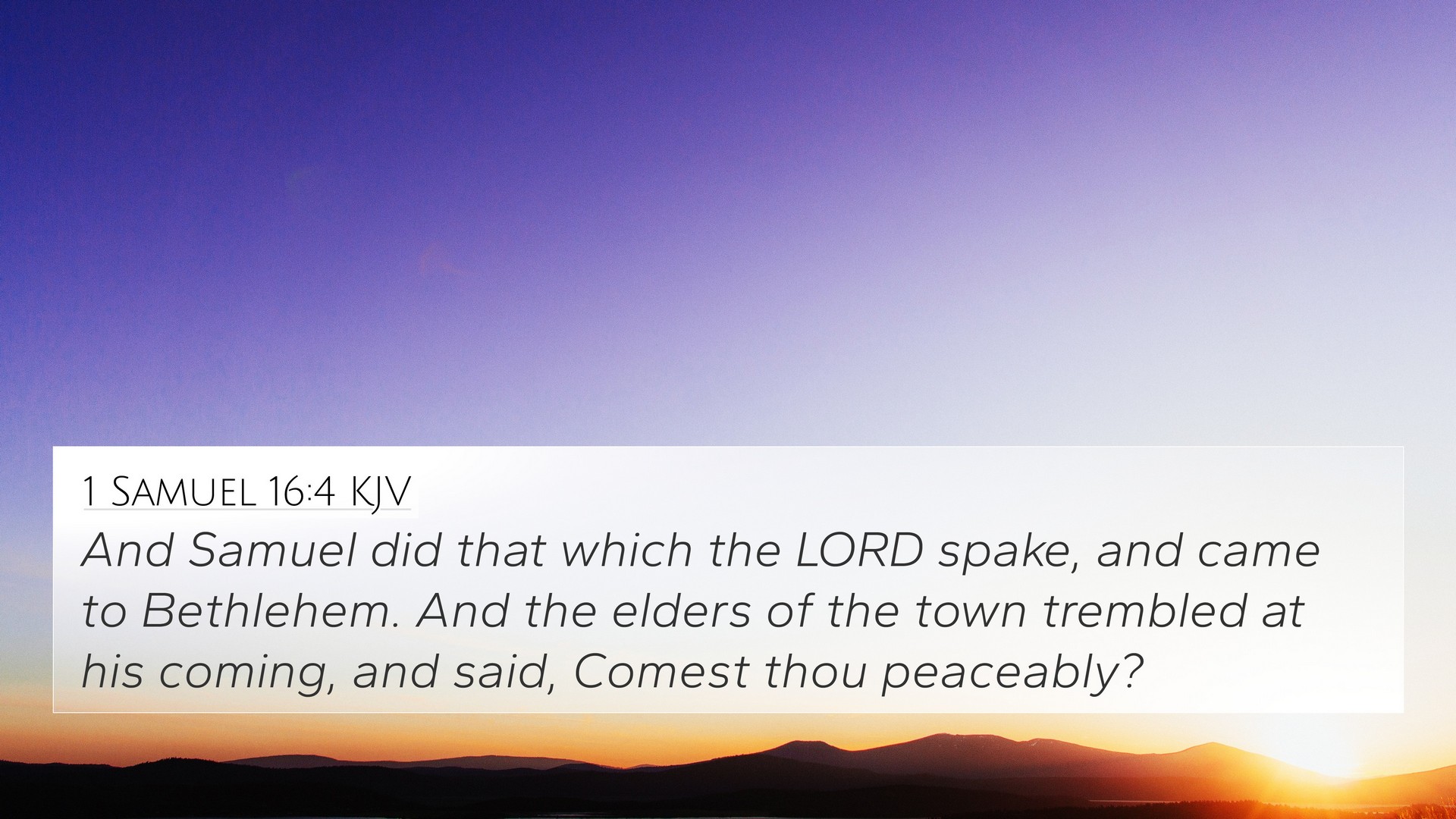Understanding 1 Samuel 16:4
The verse 1 Samuel 16:4 states, "And Samuel did that which the LORD spake, and came to Bethlehem. And the elders of the town trembled at his coming, and said, Come thou peaceably?" This moment is significant, reflecting on Samuel's obedience and the reaction of the town's elders.
Verse Summary
This verse marks a critical juncture in the narrative of the anointing of David as king. Samuel's task is not only a prophetic mission but also a challenging one. The elders' fear indicates the serious implications of Samuel’s visit, as they feared he might bring judgment because of past sins of Israel.
Commentary Insights
Insights from notable public domain commentaries reveal several layers of meaning:
- Matthew Henry: He emphasizes the integrity of Samuel, noting that his obedience reflects the seriousness of prophetic duties. Henry points out that the elders’ reaction highlights their awareness of previous sins and the gravity of the situation they face.
- Albert Barnes: Barnes provides insight into the leadership role of Samuel. He discusses how Samuel’s arrival was both anticipated and feared, underscoring the duality of prophecy, as it can bring both guidance and condemnation.
- Adam Clarke: Clarke elaborates on the societal context, explaining that the elders' trembling signifies a recognition of Samuel's authority and the possible consequences of his visit. He notes how such fear reflects the reverence and anxiety common among people encountering God’s messenger.
Bible Verse Connections
To better understand the significance of 1 Samuel 16:4, it's helpful to consider its cross-references with other significant Bible verses:
- 1 Samuel 10:1: This verse describes the anointing of Saul, establishing the context of divine selection for leadership.
- 1 Samuel 13:14: God's rejection of Saul as king due to his disobedience highlights the need for a new leader.
- 1 Samuel 15:10-11: God's remorse over Saul underlines the theme of divine judgment and the transition of leadership.
- Psalm 89:20: This psalm speaks of God's choosing of David as a leader, connecting back to Samuel's anointing task.
- 1 Samuel 16:7: Key to God's selection criteria, emphasizing His focus on the heart rather than outward appearance.
- Acts 13:22: A New Testament reference that affirms David as a man after God's heart, linking past choices to ongoing biblical narratives.
- Hebrews 11:32: Mentions Samuel among the faithful, showcasing how his actions resonate through faith history, including his anointing role.
Thematic Connections
Samuel's actions and the accompanying reactions in 1 Samuel 16:4 serve as a bridge to understanding broader themes in Scripture:
- Divine Authority: Samuel's role illustrates the weight of divine authority and obedience to God’s commands.
- Prophetic Obedience: The fear expressed by the elders reflects the tension between prophetic missions and the people’s spiritual state.
- Leadership Transitions: The passage emphasizes the biblical theme of God intervening in human leadership through anointing and selection.
Tools for Bible Cross-Referencing
Engaging deeply with the Scripture often involves utilizing various tools to enhance understanding:
- Bible Concordance: A useful tool for locating passages and themes in the Bible, aiding in comparative analysis.
- Cross-Reference Bible Study: Techniques for examining how various scriptures interact and inform one another.
- Bible Reference Resources: Guides that assist in identifying thematic connections and significant parallels.
Conclusion
By studying 1 Samuel 16:4 alongside its cross-references and incorporating insights from respected commentaries, readers gain a richer understanding of the scripture's implications. The thematic connections within the wider biblical narrative demonstrate the interconnectedness of God's message through time.
The process of cross-referencing enriches our study, allowing believers to see the broader context of God’s work through His chosen leaders and the obedience that He requires.














